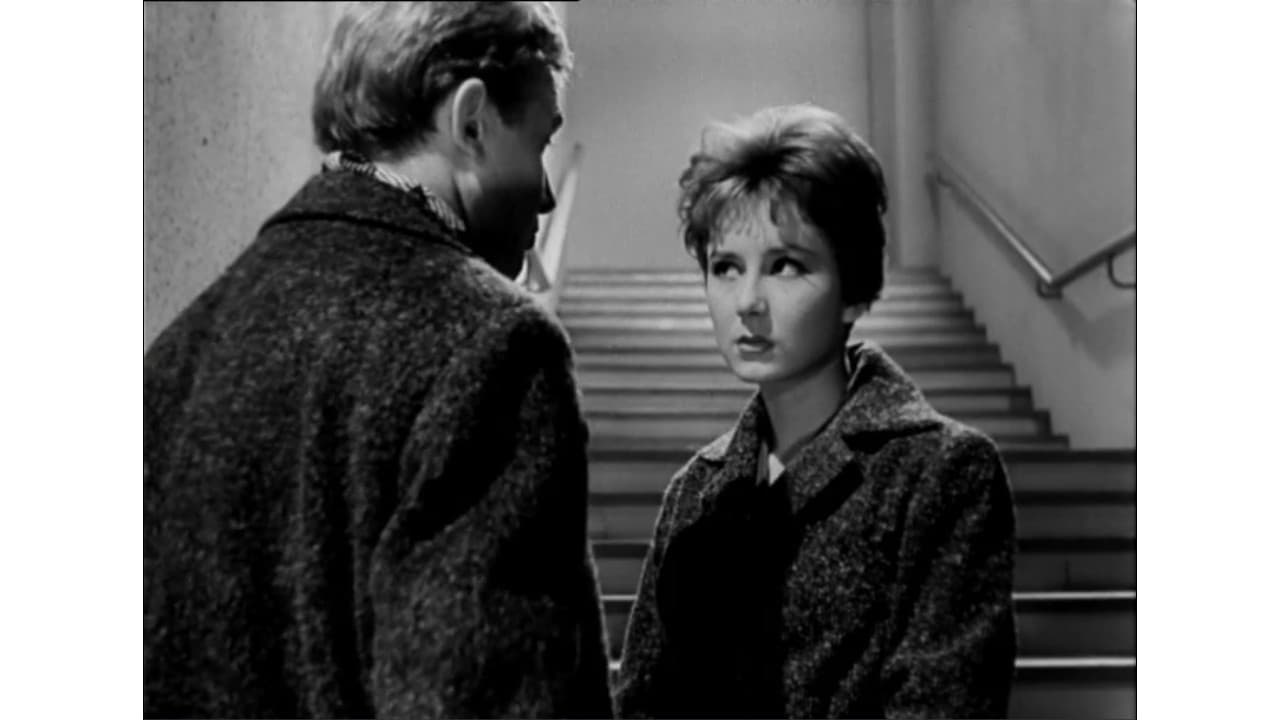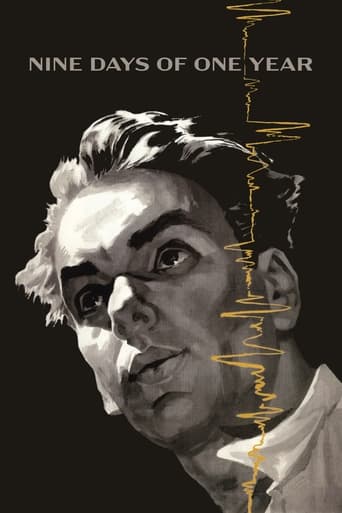

This is a movie that you must see if you want to see science and the process of fail-success. The tension is built up with the exposure of two scientists, one of whom marries another scientist. The set varies between the nuclear test lab, which is likely a real life decommissioned ammunition bunker and production factory. External scenes are the usual woodsy and natural tableau seen in these Soviet propaganda films. Food is abundant, as is booze. Each night seems to be a party. People are a little more cheerful than I think the population was. The apartments that the scientists live in seems larger than what one thinks of in the Soviet Union. Camera work is sharp, with each image having a depth of field that you don't see in US films. Acting is focused, the actor eyes all seem to be lasers looking into the depth of quantum mechanics. During a visit to relatives, the scientist hitch a ride on a steam train with only flatcars, their feet hanging over the sides of the cars. There was no attempt to hide the primitive technology that resided in parallel with this insanely advanced technology drive. If you are science nerd see this movie.
... View MoreOnce more my experience with Soviet films is confirmed: they are slow and too long and lack any suspense - like a bad love affair. In addition "Nine hours of a year" concerns the daily life in a laboratory of nuclear physics, which is itself a bore (= a man who, when asked how he is, tells you). There are a pile of nuclear physicists (inside joke), a number of mathematicians, an amalgamation of metallurgists and a line of spectroscopists. The main characters are a married couple of physicists, who drag out a stalemate position. Of course it is a drama to observe two (or more) immature adults, who just seem to vegetate. But not every drama qualifies as an interesting theme, and this film proves it. Still he has some value, provided that you place him in his proper context. So, are you ready? The real story is about ethics and morals! The Soviet Union justified its existence on the ground, that she eliminates the alienation of the working class. In the Leninist state the personal interest is supposed to coincide with the general interest (read: the interests of the state). In the first years there were the Subbotniks, collectives who continued working in their leisure time. Solshenytsin describes in his books a true case of a simple laborer, who is so naive that he physically works himself to death. It is morbid (= higher offer). To be fair, there is the capitalist analogy of the imperious business man, with his fits and cardiac affections - although the capitalist is still inclined to self preservation and selfish (= what the owner of a sea food store does). After Stalin the Soviet ideology began to enrich the collective moral with the formation of the unique personality. This paradox (= two physicists) even led to the ideological conflict and rupture with China, where Mao continued to fight individualism. Although the film is no propaganda (= a gentlemanly goose), his production may well be a reaction to this alienation between comrade states. However, the enlightenment remained poor. The democratic centralism (= the expression of deviating morals is forbidden - seriously!) continued to be the state policy during the whole existence of the Soviet Union. This spiritual climate, in combination with a strong work ethics, may indeed foster the self-destruction of people in the would-be interest of the common good. Unfortunately I doubt that the uninformed watcher, who by nature adheres to individualism, will pick up this message from the film. I hope that you enjoyed my comments (if so, don't forget to check off "useful: yes"). By the way, IMDb actually pays you. While browsing through reviews I noticed one by a Rumanian, who shares my interests. And following his strand of reviews I stumbled over Nine hours of a year. What an amazing way to save time.
... View MoreNine Days of One Year refers not to nine consecutive days but rather to the Narrator of the film cherry-picking nine important days in the lives of two nuclear scientists and the woman they both love. The movie is set during the recent thaw in the time of the Cold War and uses the same lead actor we saw in The Cranes are Flying, the great Alexey Batalov. The director, Mikhail Romm, strives to reveal a community that had been veiled during Stalin's years. Ilya, Gusev, Lyolya; three physicists connected by bonds stronger than friendship, are tasked with illuminating the mysterious world of science and technology that had (and is) often closed to the public. An amazing achievement for its subject matter, the film was both produced and set in the time of the thaw; it is a film that claims in the very beginning through its Narrator that besides scientific inaccuracies committed here and there, all other facets of this movie are as close to representing the truth as possible. One can sense immediately that the film does not merely seek satisfaction in developing and propagating a story, whatever merits contained within notwithstanding (be it setting, theme, special mechanics, character development, dialogue, screenplay); it has incorporated a narrator to expedite the process while maintaining a basic necessary structure. The film instead yields many questions about the nature of scientific discovery and the potentially deadly consequences contained within those discoveries that affect both the scientific community and mankind at large. In fact, so great is the feeling of impartiality in the presentation of these questions, an agenda so strong that the characters cease to be themselves and turn into the mouthpiece of a tangible abstraction, an unnamed character both invisible yet omnipresent. We first become aware of it when Sintsev's manic obsession with his work in the nurse's room gives way, suddenly, to a moment of complete clarity and sensitivity to Gusev, the man who had been exposed to 200 roentgens of nuclear radiation; Sintsev suggests that Gusev find a girl before it is too late. How very uncharacteristic of a man who was just earlier celebrating his scientific breakthrough and ready to keep working even though in Gusev's words "he had killed himself" due to the exposure. Other times amid the scientific banter, theories, thought experiments and the like littering the movie, comes more transcendent ideas, detailing the correlation of scientific progress with the advent of war, a conversation played out by two scientists, whose conclusion is that the interests of science are aligned with those of war. Ilya and Gusev may be two more vessels for this omnipresent guiding voice while Lyolya seems to be purposefully granted immunity; for she is granted her own private thoughts, and is the one character who doubts herself as a scientist and instead thinks first of herself as a wife. Ilya questions the ultimate implications of scientific discovery and asks, "What good does it do?" Gusev, however, the character most immersed in the scientific realm and obsessed by his work, perhaps offers the greatest and strangest consolidation of the essence of the film. In a letter closing out the film, written to Ilya and Lyolya, he draws a picture of the three holding hands and asks to grab a bite to eat at a local café. The scene is a breathtaking exposition that humanity is more important than progress, which of course can be read as a refutation of the communist ideal.
... View MoreI am inclined to say I enjoyed the movie, though it was far from perfect. Did we need a narrator? His presence at the start of the movie hinted at a fairy tale. Not only was this not the case, but by the time he appeared again – at the end of the film – I had forgotten he was there and jumped, thinking, "Oh, that's right, there's a narrator here." I'm also not sure I agree with the film's message, or if I even find it realistic enough to be believable. We see Gusev's teacher happily give his life for science and then see his apprentice happily follow the same path. I wish we had gotten a longer bout of skepticism than the two minutes of screen time given to Gusev's father. I found myself completely agreeing with him. Do we need these atoms right now? Wouldn't it be better if science first researched a safe way to observe them? This made Gusev's character harder to relate to for me. Does he not value his own life, or does he place greater value on continuing Sintsov's experiments? Past that, the film was likable. I found it somewhat saddening that the science it described was presented more accurately than our own. I can't remember the last time I watched a movie that depicted the risks of carrying out new experiments. It's sad that our current movies tend to focus on the action and progress brought about by science and not on the risks it carries. Despite Gusev's willingness to give up his life, I found the movie more believable for how it handled the science. I was also pleased with how most researchers (aside from Gusev, who, again was wholly devoted to his work) were presented outside of their labs. The scenes of them eating dinner and living at home humanized them, and made the film more real. In the end, I enjoyed Nine Days In One Year, but no thanks to Gusev's presence, and I do think it can do without the half-hearted narration.
... View More